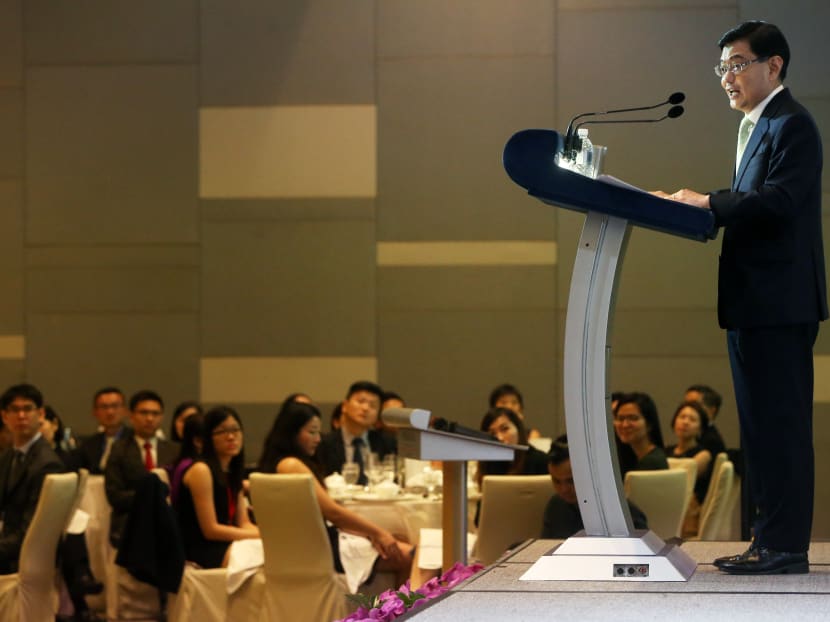‘Good politics’ helps civil servants stay non-partisan, work with integrity: Heng Swee Keat
SINGAPORE — Civil servants are able to work fairly, with integrity and remain non-partisan because “good politics” has created the space for them to do so, said Finance Minister Heng Swee Keat on Tuesday (Mar 03).

Finance Minister Heng Swee Keat at the 2018 Administrative Service Dinner and Promotion Ceremony held at Parkroyal on Beach Road. Photo: Ooi Boon Keong/TODAY
SINGAPORE — Civil servants are able to work fairly, with integrity and remain non-partisan because “good politics” has created the space for them to do so, said Finance Minister Heng Swee Keat on Tuesday (Mar 03).
Good policies and politics can help transform the public service and prepare them for major shifts, such as the rise of Asia and technological changes, said Mr Heng, who was speaking at the annual Administrative Service dinner and promotion ceremony at Parkroyal on Beach Road hotel.
Describing what he called a “virtuous circle of good politics and good policies” here, he said it consists of the political leadership winning its mandate from people, based on the promise that the elected government will make and implement good policies. That mandate is strengthened when political leaders guide and work with the public sector to deliver the policies, he told about 220 guests who included Deputy Prime Minister and Minister-in-charge of the Civil Service Teo Chee Hean.
“With a stronger mandate, the political leadership can better ensure the good politics that create the space for public servants to formulate good policies.” Mr Heng, seen by some as one of the frontrunners to be Singapore’s next Prime Minister, said the public service must play its part to safeguard and strengthen it.
According to him, political leaders here and public servants share the common cause of serving the public and nation-building, and share a mutual trust.
The politicians can trust the civil service to serve the Government of the day by formulating and implementing sound polices, while the civil service can also trust the politicians to put effort in winning and keeping the people’s trust so it can work with integrity.
Mr Heng cited an exchange he had as a civil servant with the late founding Prime Minister Lee Kuan Yew.
Mr Heng had said he enjoyed his work as a civil servant, as it could make a difference to people’s lives.
Mr Lee told him: “You are able to do the right things only because our politics is right. Don’t take that for granted.”
In contrast, the politics in some other countries limits a minister’s ability to plan for country’s future or an urban planner’s ability to scale up her community project, he said.
The minister urged the public service to take a “whole of society” approach in its work.
Reiterating Education Minister (Higher Education and Skills) Ong Ye Kung’s call for innovation within the public service at last year’s ceremony, Mr Heng noted the need to be strategic as well.
“Innovation will involve risk-taking, but we cannot simply adopt the start-up’s mantra of ‘fail fast, learn fast’,” he said. “If a start-up fails, it loses money and effort. If the public sector fails, it loses citizens’ trust, investors’ confidence, and more. There is a real effect on people’s lives.”
Citizens expect fair and consistent treatment to be able to pursue their aspirations and care for their families, while investors need long-term certainty and consistency to invest for the long-term and create jobs and growth, he said.
Mr Leo Yip, head of the civil service, said several changes must be made to respond to inflexion points in Singapore’s demography, economy and society.
There is also a need to address technological disruptions and the shift in global economic and strategic weight towards Asia.
Public servants will look to the Administrative Service officers to exemplify and make the changes, said Mr Yip, who took over from Mr Peter Ong last September.
Sixteen officers were appointed into the Administrative Service – which grooms future public service leaders – and another 57 were promoted on Tuesday.
Among those promoted was DBS project manager of group planning Sanjay Nanwani, 32, who was seconded to the private sector in May last year. He was previously with the Foreign Affairs and Transport ministries.
He has since been rotated across a number of roles within the bank, and advises companies in his current role on corporate finance, including issues relating to restructuring, mergers and acquisitions.
Initially apprehensive about the secondment, Mr Sanjay said he decided to step out of his comfort zone.
The private sector “offers many lessons and reminders”, such as the power of markets and competition, the importance of marrying strategy with execution and the imperative for innovation and cost discipline, he said.
“Transitioning to another job – let alone another sector – is never easy, but patience, humility, supportive colleagues and a good dose of fun have helped immensely,” he said.






